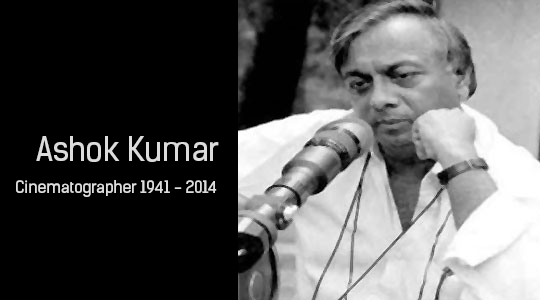
ASHOK KUMAR
Born in Allahabad to Kedarnath Agarwal, a Hindi poet, Kumar was passionate about cinema right from his childhood. His family, not connected to films, was initially not supportive of his decision but eventually agreed imposing that he should go only to Madras rather than Bombay. After obtaining a diploma in photography from the Allahabad University, he went to Madras and joined the Institute of Film Technology, Adyar to do a course in motion photography. At the institute, he watched films from World cinema including that of Satyajit Ray’s. After graduating from the institute, he made his debut as a cinematographer in the 1969 Malayalam film Janmabhoomi. The film was made by a group of friends who studied with him at the institute. John Sankaramangalam, his teacher at the institute was its director.
Kumar had financially supported the film in its pre-production work and distribution. Janmabhoomi explored themes including migration and religious co-existence, and won the Nargis Dutt Award for Best Feature Film on National Integration at the 16th National Film Awards. Kumar also became the first recipient of the Kerala State Film Award for Best Cinematography for the film;. Following that, he worked in numerous Malayalam films for directors such as P. N. Menon, Ramu Kariat, and Bharathan. His involvement with the Malayalam film industry in the 1970s, earned him two more Kerala state government awards, in 1973 and 1977 for Swapnam and Taxi Driver (Black-and-white) respectively.
In 1978, when Tamil film director J. Mahendran was searching for a cinematographer to shoot his directorial debut Mullum Malarum, he approached Malayalam cinematographer Ramachandra Babu. Babu who was busy with his Malayalam films at the time suggested Kumar to Mahendran. However, another cinematographer Balu Mahendra was eventually selected for the film based on actor Kamal Haasan’s suggestion to Mahendran. For his second film Uthiripookkal, Mahendran approached Kumar to be the cinematographer as Balu Mahendra was busy directing Azhiyadha Kolangal. Mahendran had watched some of Kumar’s films in Malayalam and found some of his angles and lighting techniques to be very interesting. Kumar accepted the offer this time, thus making his Tamil cinema debut. Following the film, Ashok Kumar continued to work in many Tamil films. He became Mahendran’s regular cinematographer and worked in 9 of his 12 films. They collaborated in films including: Johnny (1980), Nenjathai Killathe (1980), Nandu (1981), and Metti (1982).For his work on Nenjathai Killathe Kumar garnered “Best Cinematographer” awards at the national, and state level.
During the 1980s, Kumar started to work more on commercial films. He cinematographed My Dear Kuttichathan (1984), India’s first 3D film. His Hindi films included Kamagni (1987), Bawandar (2000) and Kehtaa Hai Dil Baar Baar (2002). Bawandar received international acclaim as it won the “Best Picture” awards in many international film festivals. Kumar also won the V. Shantaram Award for Best Cinematography for the film. He served as jury member of the 43rd National Film Awards. Over his film career, Kumar’s assistants included P. S. Nivas, Suhasini Maniratnam and B. R. Vijayalakshmi. Contemporary cinematographers such as Balu Mahendra, P. C. Sreeram, Babu and Venu have also spoken of being inspired by Kumar’s work.
Awards
- National Film Award for Best Cinematography
- Kerala State Film Award for Best Cinematography
- Tamil Nadu State Film Award for Best Cinematographer
- Nandi Award for Best Cinematographer
Filmography
- Janmabhoomi (1969)
- Ezhuthaatha Kadha (1970)
- Avalalpam Vaikippoyi (1971)
- Kuttyedathi (1971)
- Maappusaakshi (1972)
- Kalam Marindi (1972)
- Chembarathi (1972)
- Chaayam (1973)
- Darshanam (1973)
- Mazhakkaaru (1973)
- Gaayathri (1973)
- Manushyaputhran (1973)
- Swapnam (1973)
- Kaamini (1974)
- Moham (1974)
- Odakkuzhal (1975)
- Nurayum Pathayum (1977)
- Taxi Driver (1977)
- Guruvayoor Kesavan (1977)
- Aaravam (1978)
- Njaan Njaan Maathram (1978)
- Sathrathil Oru Raathri (1978)
- Ee Ganam Marakkumo (1978)
- Randu Janmam (1978)
- Jayikkaanaay Janichavan (1978)
- Aniyara (1978)
- Uthiripookkal (1979)
- Thakara (1979)
- Lovely (1979)
- Ullasa Paravaigal (1980)
- Pootaadha Pootukkal (1980)
- Kaali (1980)
- Lorry (1980)
- Johnny (1980)
- Nenjathai Killathe (1980)
- Manjil Virinja Pookkal (1980)
- Swathu (1980)
- Malankaattu (1980)
- Nandu (1981)
- Metti (1982)
- Azhagiya Kanney (1982)
- Darling, Darling, Darling (1982)
- Novemberinte Nashtam (1982)
- Thadaakam (1982)
- Kaikeyi (1983)
- Mundhanai Mudichu (1983)
- Ente Mamattikkuttiyammakku (1983)
- My Dear Kuttichathan (1984)
- Parannu Parannu Parannu (1984)
- Kalkki (1984)
- Nokkethadhoorathu Kannum Nattu (1984)
- Kai Kodukkum Kai (1984)
- Pillai Nila (1985)
- Kanni Rasi (1985)
- Thendrale Ennai Thodu (1985)
- Paaru Paaru Pattinam Paaru (1986)
- Rithubhedham (1987)
- Andru Peytha Mazhaiyil (1989)
- Jeeva (1988)
- Daisy (1988)
- Vetri Vizha (1989)
- Orukkam (1990)
- My Dear Marthandan (1990)
- Nadigan (1990)
- Vasanthakala Paravai (1991)
- Suriyan (1992)
- Magudam (1992)
- Mannan (1992)
- I Love India (1993)
- Indhu (1994)
- Kattumarakaran (1995)
- Jeans (1998)
- Malabar Police (1999)
- Bawandar (2000)
- Tales of The Kama Sutra: The Perfumed Garden (2000)
- Sri Sai Mahima (2000)
- Kehtaa Hai Dil Baar Baar (2002)
- Kovilpatti Veeralakshmi (2003)
Source : https://en.wikipedia.org/wiki/Ashok_Kumar_(cinematographer)
